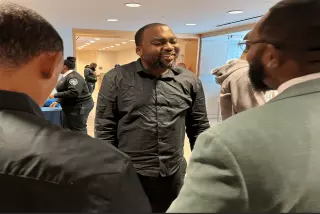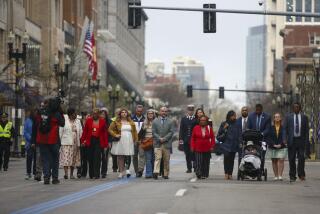Coping with changed lives
She’d raised five children by herself, and Liz Norden was ready for the empty nest.
Two of her daughters, 24 and 26, still lived with her, but they were barely home and busy with their own lives, so Norden, 51, talkative and cheery, was beginning to have days and nights to do what she liked: spend time with friends, play poker, maybe just relax.
But then a bomb tore through the Boston Marathon, sending torrents of shrapnel through a crowd. Norden’s phone rang that day, and she heard her son Paul say, “Ma, I’m hurt real bad.”
Paul hovered on the edge of death for days, and the family could not immediately locate another son, J.P., who had just one pint of blood left in his body when he arrived at a hospital. Both brothers lost their left legs: J.P. below the knee, Paul above the knee.
It’s obvious that the lives of many of the Boston Marathon bombing victims have been changed forever. J.P. and Paul, both fit men in their 30s, were roofers, and will probably look for a new line of work. What’s less obvious is how entire families have been damaged.
Authorities say 264 people were injured in the bombings, and 16 lost limbs. That translates to hundreds, perhaps thousands, of family members and friends whose lives, too, were changed dramatically on April 15. For some caregivers, the changes were temporary, perhaps until a victim completed rehab.
For others, like the Nordens, the challenges continue.
Norden recently moved from a third-story apartment to a ground-floor, three-bedroom unit to accommodate J.P. and Paul, who live with her for the time being. She sleeps on the couch because her youngest daughter is still living with her, plus she wants to be able to hear her sons if they call out in the night, which they often do.
Norden, who is separated from her husband and cleans houses for a living, takes her sons to medical appointments, does their laundry, sits nervously through their surgeries. And, in ways she hasn’t in years, worries.
“You’re constantly worried -- God forbid there’s a fire in the middle of the night and they don’t have their leg. It’s just different now,” she said. “Paul has gotten up to go to the bathroom in the middle of the night and fallen, and of course he says he calls me and I don’t hear him.”
J.P., 34, is still using crutches as he learns to use his prosthetic, so she helps him carry things: his plate of food, his laundry, his iPad. The boys, as she calls them, have urinals in their bedrooms at night as they adjust to the difficulty of getting up and attaching a prosthetic; she empties them daily.
The work never seems to end. But it’s what mothers do.
“It’s never-ending -- it’s just completely different. You think it ends at night, but no, he wants a drink, so you have to go get it,” she said. “Not that I’m complaining -- I’m so thankful they’re here with us.”
It’s not just day-to-day activities that change. Relationships evolve too. The strongest member of a family may now have to ask for help; people who once stayed away from relatives now have to assist, whether they like it or not.
“There’s a lot of change in the dynamics of family,” said Sally Johnson, an outpatient social worker at Spaulding Rehabilitation Hospital in Boston, which worked with many of the marathon victims and their families. “One of the struggles is that there’s secondary loss for the family. Their lives are certainly greatly affected as well.”
In the Norden family, the four younger children always turned to J.P. for help and advice; as the oldest, born when his mother was 17, he helped raise them all.
“I hate having to ask anybody for anything, whether it be my little brother, my sister, my mother,” he said. “My mom doesn’t complain -- none of them do -- but it stinks they have to be around to do all this.”
His girlfriend of three years gave up her job as a nanny to help care for him, sometimes bathing him.
Other families of marathon victims also talk about lives altered since the bombing.
Jarrod Clowery, who is good friends with Paul and J.P. Norden and was injured alongside them, although not as severely, says his best friend quit his job to sit by Clowery’s hospital bedside -- even as the friend was going through a divorce. His sister dropped everything to help care for him, he said. Clowery is also constantly impressed by Liz Norden.
“You have two 30-something-year-old boys with no leg; do you know what that woman’s done and been through?” he said. “She’s been as low as she can go, but she did it like she was nothing.”
Norden’s sister, Cheryl Casey, accompanies her to every surgery, holding her hand through what they jokingly call “Lizzy time,” the hours after the surgery when doctors haven’t yet come to speak to them and Norden is sure her sons are dead. Casey talks to Norden a few times a day, soothing her when her sister is feeling low.
Casey sees the repercussions of the bombings every day. It’s tough to watch J.P. and Paul cringe whenever there’s lightning, and to see J.P. fall when he tries to walk on his own. It’s heart-wrenching to hear her sister panic when a little household emergency happens, like when the dryer breaks.
Norden always worried, the family says, but her anxiety has only increased since April. When her daughter went on a cruise recently, Norden didn’t sleep the entire first night she was gone.
“I was always a worrier, but nothing like this,” she said. “You’re just so afraid to get that phone call.”
If her sons are staying at home, rather than at their girlfriends’ houses, Norden won’t go to sleep until both are in their beds -- something she did when they were teenagers. On a recent weeknight, J.P. and Clowery went to a bar on the South Shore of Boston, and Norden waited up, as she always does these days. She and J.P. talked at midnight, and he assured her he’d be coming home.
By 3 a.m., there was no sign of him, and his phone went straight to voice mail. Norden was convinced her son had gotten into a car accident, or was lying somewhere, legless, by the side of the road.
She began to panic, calling J.P.’s girlfriend, Kelly, and waking her up. Kelly finally thought to check at the Elks Club, where she found them, oblivious to the fact that their phones didn’t get reception there.
J.P. gently chides his mother for her tendency to assume the worst, and says her worried texts make her sometimes seem like a lunatic. But Norden, who laughs at herself too, can’t help it. She never thought the worst could happen to her sons, and it did. Now she’s seen her boys badly burned, bloodied and bandaged, her instinct is to worry. It’s what mothers do.
--
More to Read
Sign up for Essential California
The most important California stories and recommendations in your inbox every morning.
You may occasionally receive promotional content from the Los Angeles Times.











